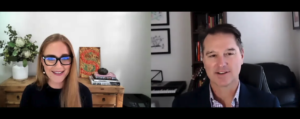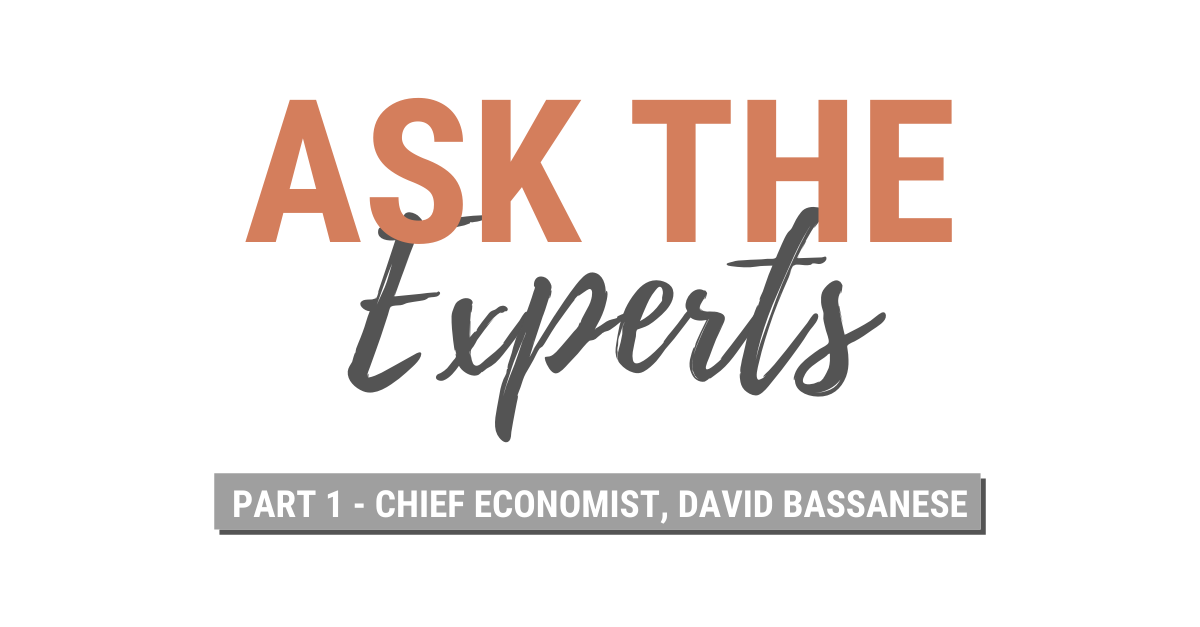In the first episode of our Ask The Experts series, Jess discusses the current state of the market and opportunities on the horizon with Chief Economist, David Bassanese.
When it comes to investing, there’s a sea of information to wade through. We understand finding valuable insights can be complicated and confusing, which is where our Ask The Experts series comes in. In this new video series, we sit down with leading industry experts to answers our community’s burning questions on investing, property and everything in between.
In Episode 1, Jess sits down with Sydney-based Chief Economist David Bassanese. As the author of Australia’s leading guide to exchange traded funds, a senior financial columnist at the AFR and with previous experience at the Federal Treasury, David has a wealth of experience in navigating the financial markets.
In this conversation, Jess and David discuss his predictions for equity markets, the current state of markets globally as well as any areas of opportunity on the horizon. Let’s take a look at what the pair discussed in this exclusive Q&A session.
David’s insights and predictions for the market
With the headlines constantly reminding us how turbulent the markets are, we wanted to get David’s two cents on the current state of the market.
In his view, “we are clearly in a global recession, and it’s a very deep recession. The only question really is how long this recession will last,” tells David. “With the Coronavirus shutdowns, the economy is incredibly weak. Basically, we’ve gone into a period of hibernation.”
But David also notes that some small gains have been made in recent weeks as countries across the globe begin to ‘flatten the curve’. “If you look around the world, countries are slowly and gradually beginning to open up their economies again,” tells David. “In recent weeks the markets have rebounded on the hopes that we can reopen quickly and get things back to normal. We’re really in that stage of trying to get businesses back open, which could mean we’ve seen the bottom in the equity market and things can continue to rebound.”
However, David is quick to temper his optimism as he reveals, “the outlook of the markets is really dependent on the outlook of this virus. That means we need to consider the likelihood of a second wave of infections as restrictions begin to lift. We’re still grappling with understanding the severity of this virus and so that cautions any predictions we can make at this stage. Although we have seen some level of recovery already, I think markets are too optimistic. I don’t think we’re out of the woods yet,” David explains.
In more positive news for investors, David does share that there will be some opportunities for investors looking to enter the market.
“Usually in recessions, markets can fall a long way and get very cheap. So, the bad news is that markets are down (and could even go down further), while the good news is that there are new entries points into the market from a longer-term perspective. Now could be a good time to buy into weakness and edge in while markets are down. It’s better to be buying now rather than buying at the market high where valuations are very high,” tells David.
During the conversation, Jess and David continued to discuss the broader implications of COVID-19 on the markets and how this has impacted investor behaviour. Plus, David shares his expert insights into questions such as “do you think the equity markets will fall further when businesses post their full year results?” and even if he has “any views on the potential impact of the upcoming US elect on the market?”.

Our top 3 takeaway points
Although David shares countless valuable insights in this conversation, what are the top 3 points to take away from this conversation?
- Tip 1: “ Often doing nothing is the best strategy.” During periods of uncertainty and volatility, a lot of investors feel they need to be buying or selling. But David would advise that we resist this urge to ‘do something’ and look at the equity market from a broader perspective. “The average retail investor tends to sell out at the bottom and buy at the top, which isn’t the best strategy to follow,” David explains. Try to avoid getting spooked by the headlines, be patient and stick to your long-term investment strategy.
- Tip 2: Investing through an index fund enables you to ride out these periods of turbulence with assurance that markets will recover. These diversified funds mean you are invested across a broad range of companies. Even when certain companies drop in value, others will rise and even out any losses you may encounter.
- Tip 3: Remember why you invested in the first place. Although we have access to lots of information that might make us feel like we need to change our portfolio, it’s important to come back to your long-term investment plan and stick to this. Navigating periods of turbulence are all a normal part of the journey towards long-term wealth.
What our members thought
We were so thrilled to have so many of our members tune into this live Ask The Experts session. Here’s what a few of our members had to say following the broadcast:
- “Interesting session. Knowledge is power.”
- “This information has confirmed my own thoughts about this being a buy opportunity but through ETFs not single pick stocks.”
- “Very accessible! Top tips from the session include: don’t make any rash investment decisions, think like a consumer and be grateful I have a job.”
Keep an eye out on our social channels and upcoming newsletters for more information about our next Ask The Experts live Q&A session.
Want to know more about becoming a F&H member? Click here to book in for a quick chat.

